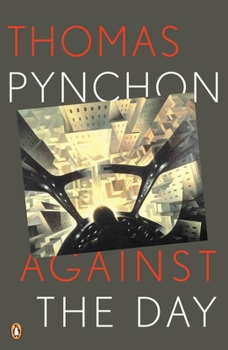Against the Day
Select Format
Select Condition 
Book Overview
A New York Times Bestseller - A Washington Post Best Book of the Year - A New York Times Notable Book " Pynchon's] funniest and arguably his most accessible novel." --The New York Times Book Review "Audacious, bodacious, entropic, synoptic, electric, eclectic, entertaining, hyperbraining, high-roller, tripolar . . . Buy Against the Day." --The Philadelphia Inquirer Spanning the era between the Chicago World's Fair of 1893 and the years just after World War I, and constantly moving between locations across the globe (and to a few places not strictly speaking on the map at all), Against the Day unfolds with a phantasmagoria of characters that includes anarchists, balloonists, drug enthusiasts, mathematicians, mad scientists, shamans, spies, and hired guns. As an era of uncertainty comes crashing down around their ears and an unpredictable future commences, these folks are mostly just trying to pursue their lives. Sometimes they manage to catch up; sometimes it's their lives that pursue them.
Format:Paperback
Language:English
ISBN:0143112562
ISBN13:9780143112563
Release Date:October 2007
Publisher:Penguin Books
Length:1104 Pages
Weight:1.98 lbs.
Dimensions:2.0" x 5.5" x 8.3"
Age Range:18 years and up
Grade Range:Postsecondary and higher
Customer Reviews
4 ratings
Don't Read it to Quickly!
Published by Thriftbooks.com User , 18 years ago
It took me over a year to read this book, and as I skimmed through some of the more "professional" reviews of Against the Day, many of which appeared roughly a year ago or even earlier, I can't help but think, "Maybe they read it too fast?" For there is much that is infuriating about Against the Day. Primarily, it's the fact that at 1089 pages long, there is no way to minimize the effort required to read it. Second, the plot is maddeningly elliptical, and it takes close to 400 pages before you really grasp what, exactly, is going on. Third, Pynchon fills Against the day with digression- not exactly a new phenomenon when it comes to fiction, but after your fifteenth twenty five page exegesis on Balkan geography or Albanian culture or whathaveyou, it's easy to see how a reviewer might be frustrated. Balanced against its infuriating nature are several counter-points which lead me to the opinion that Against the Day is actually a superb, enjoyable novel. First of all, the plot isn't that difficult to grasp: Basically, anarchist coal miner Webb Traverse is killed at the behest of evil industrialist Scarsdale Vibe. He leaves behind three sons and one daughter. Most of the book involves the attempts by Webb's sons to avenge their father's death. In the process, they have many adventures in places like Mexico, Germany, the Balkans & Central Asia. They meet, marry and have kids during the course of their adventures. Along the way there is a lot of math, a lot of physics and a lot of mumbo jumbo. Together with this basic revenge plot is the interwoven story of the Chums of Chance, a bunch of boy adventurers who circle the globe in their zeppelin. The Chums of Chance don't really directly encounter the Traverse's, but they figure in the background of many of the locations. And that's basically it, in terms of plot. Of course, with Pynchon, narrative focus is the least of his worries, and if you aren't down for digression, then sir or madam, you have no business reading Thomas Pynchon. In order to enjoy the digressions, you need to have some idea of the mise-in-scene, so to speak- the backdrop- the current events that form the setting for Against the Day. The time and place is roughly the 1870s to the end of World War II- 1918 or thereabouts. So if you want to get the most out of Against the Day, have a working familiarity with historical events like the Chicago World's Fair, Labor History of the American West, Mexican politics in the 19th century, European Diplomacy in the Balkans before World War I, Theoretical Mathematics and Physics of the 19th century, The Cult of Pythagoreous in Greece, The "Great Game" i.e. Central Asian diplomacy in the 19th century/20th century & Pulp Adventure Novels from the early 20th century. Personally, I'm about 4/8 on that list, and that was just about enough. It's clear that one of the contributing factors to the enormous length of Against the Day is Pynchon's fondness for the theme of doubli
Ignore the early reviews
Published by Thriftbooks.com User , 19 years ago
Opinions vary, but the numerous reviews that were produced at the time of this books release will likely be long forgotten by the time most folks actually make their way through this thing. One guesses that these reviewers must have felt pretty agitated being put in a position of having to rush through over a thousand pages of Pynchonian sophistication in the short time they had from receiving their pre-release copies to the start of the holidays. So in a rush to speed read through the thing's numerous characters, and overlapping and not always synchronous plots, and, mainly, the detail points of social and scientific abstractions that abound, seemed an unwelcome nuisance to deadlines for last weekends book section. Taken at a more leisurely pace, this novel is, in fact, very accommodating, especially compared to the delightful, but verbage challenging Mason Dixon. Far from the blur of comically named stereotypes that have been alleged, the characters are more than adequately drawn with sufficient depth, if not to the unusual (for him) affection that Pynchon displayed for the aforementioned boundary makers. The accessibility of the book also comes from a consistent level of humor, more droll than uproarious compared to his earlier work. It is this consistency of observation and discourse that makes Against the Day stand out from all that has proceeded it. In a way, it seems somewhat reminiscent of the stylistic change that Melville produced in The Confidence Man that distinguished it from the dramas that proceeded. Like the new novel here, there is a constant motion to the story as the focus changes from on character to the next, producing a works that are more esoteric than heart-wrenching. Is too much of a good thing bad? Not if you have the time to savor all the wondrous elegance that goes into it. As long as you don't have a deadline haunting, you may find this the best voluminous post-modern epic of all (at least since Barth's Letters, and requiring a lot less effort).
Slow Down, Enjoy The Ride
Published by Thriftbooks.com User , 19 years ago
The temptation with a huge novel like "Against The Day" is to read it at breakneck speed. Pynchon discourages readers from that option early, signalling within the first 60 pages that this is going to be a tale of many characters, many narrative lines, at times realistic, at others fantastic, often rooted in history, at other times unquestionably about the present. For such a mysterious writer, Pynchon's influences are well known and fully on display here -- the Western scenes evoke Oakley Hall's "Warlock", the discussions of anarchy jibe with Pynchon's own reading (misreading?) of Orwell's "1984", allusions to "Finnegans Wake" are everywhere (even in the name of the comical adventure troop the Chums of Chance.) The book was savaged by some critics with a notable air of self-pity ... oh it's so long, oh it's so meandering, oh I didn't bother to finish it. Yes, there are major reviews in major American publications where paid critics admitted to skimming over most of the last 300 pages. A crime and a pity, because it's only in the last few hundred pages where "Against The Day" fully reveals itself. Critics (and readers) who enter this journey with hard and fast rules of what a novel should (or must) be are warned here ... you may very well hate it. Pynchon's characterizations can be muddled at time -- it took a second reading with the help of the superb audiobook (I don't know if they give Grammys for audiobook performances, but Dick Hill's is outstanding and worthy of some kind of award) for me to fully appreciate the cavalcade of characters. There is no central character, no central plot, but there are a multitude of character arcs and human interactions that I found heartbreaking. All of the great drama of human life is here -- but it's told in the signature, detached Pynchon style. Critics have pointed out one clear flaw -- the book is all over the place. Pynchon jammed everything into this book, leftover threads from every other novel he's written, plus bits from all his favorite books and whatever scientific or philosophic musings he has left on the table. It has the feel of a big book by an aging master who fears that he might not write another. The four Traverse children have enough development for maybe two fully drawn characters. Kit, because of his resemblance to other Pynchon intellectual heroes, you expect to be the main character, but he disappears into the plot for hundreds of pages, much like Tyrone Slothrop did in the waning pages of Gravity's Rainbow. Eldest son Frank Traverse just isn't all that interesting and his meanderings in Mexico are the weakest part of the novel. Daughter Lake and out-of-control drifter Reef are the most compelling of the litter and a book focused solely on them might would have been more tightly focused (Although Kit is clearly needed as a bridge to all the mathematical warfare central to the book's second half.) So it could have used a more thorough edit ... and yet, I'm glad it's all
Pynchon's Best Novel
Published by Thriftbooks.com User , 19 years ago
This book represents the best of Mr. Pynchon's novels. I appreciated all of his works but here is the culmination of his art. As with Mr. Zimmerman's recent concert tour, we now have an artist of the 1960's, who has transcended his comfortable art form. Unlike V and Gravity's Rainbow, which exhausted us with genocide and holocaust, Against the Day not only suggests Tom Swift, Jules Verne, Mark Twain, and Dickens but Cervantes and Shakespeare's The Tempest as well. This novel has great beauty, and, unlike some recent reviews have suggested, reflects the art that the 21st century requires. It is not just an echoing of past ideals. It is a novel that was written by a father concerned by the future of his child. Our time needs not only the humor of Groucho Marx and the Pythons, but this Pynchon as well, as we stumble into the future that Mr.(s) Bush, Cheney, and Bin Laden have given us. My only concern is that Mr. Pynchon has buried his staff and that we may no longer hear from this magician any further.
Against the Day Mentions in Our Blog

Really Big Books
Published by Ashly Moore Sheldon • May 12, 2022
In this age of distraction, thick volumes can feel intimidating. On the other hand, when we’re reading a really good novel, we never want it to end. Here’s a selection of sixteen whopping reads that are truly worth the time it takes to read them.






